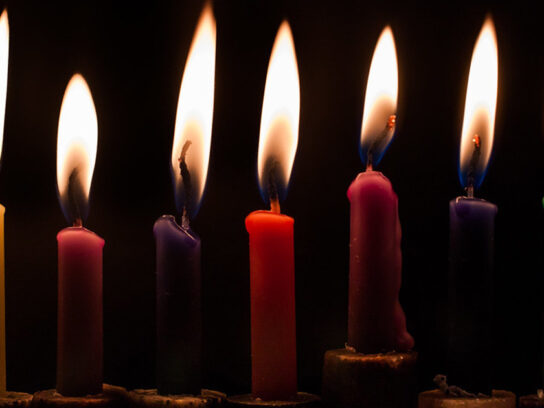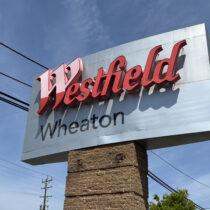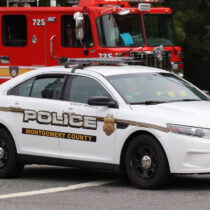
Many families celebrate the holiday season with tree decorating, candle lighting, and home-cooking. These traditions, while heartwarming and fun, create the perfect conditions for home fires. According to the American Red Cross, the rate of home fires increases during the winter months and peaks in December and January. Montgomery County Fire Chief Scott Goldstein provides guidance to help keep the community safe this year.
Trees
Christmas trees require special attention. When selecting a tree, freshness is important. Check the needles to make sure they are green and difficult to pull back from the branches. If the tree has been freshly cut, the needles should not break. Tap the tree on the ground several times and notice if any needles fall off. If they do, the tree is probably dried out and could be a fire hazard. Water your tree daily and do not place the tree close to a heat source, including a fireplace, radiator, space heater, or heat vent. Make sure your tree is in a sturdy holder and can’t be knocked over by pets or children.
🎄Tree & Dogs#DYK tree water can be harmful? Chemicals from fertilizers can transfer to the water in the stand & stagnant tree water can also be full of bacteria that can make your #dog sick if they drink it. Use a covered tree water dish to be safe (and check water levels)! pic.twitter.com/paYcwe2zPw
— MontgomeryCo(MD)Fire (@mcfrs) December 9, 2022
Cooking
Cooking is a top cause of holiday fires. Be alert and focused and stay in the kitchen when cooking. Keep things that can catch fire, such as oven mitts, wooden utensils, food wrappers, and towels away from the cooking area. Make sure kids and pets stay at least three feet away from the stove and oven, hot food, and liquids to avoid serious burns.
"Put A Lid On It"
Always keep an oven mitt and pan lid (or cookie sheet) nearby when you’re cooking. If a small fire starts, slide the lid over the pan to smother the flame. Turn off the burner and leave the pan covered until it is completely cool. #dinner #standbyyourpan pic.twitter.com/KPojbDGyFy— MontgomeryCo(MD)Fire (@mcfrs) December 1, 2022
Candles
Most holiday candle fires occur when people leave burning candles unattended or place candles too close to holiday decorations. Keep candles in sight, in a secure holder and on a safe surface away from children and pets. Consider using flameless, battery-operated candles making them much safer.
🕯️A candle left alone is a dangerous candle. Don't burn candles and leave them.
Fact: A candle is an open flame which means it can easily ignite anything that can burn. Please candle with care. And consider @mcfrs favorite: flameless #candles. #homedecor #HolidaysAreComing pic.twitter.com/ZMshcO3Eyt
— MontgomeryCo(MD)Fire (@mcfrs) December 1, 2022
Fireplace
Every year “cold” ashes result in house fires. Treat all ashes and coals as hot ashes, even when you think they have had enough time to cool. Your garage, house, or deck are unsafe locations for ashes to cool and have been the site of many recent and devastating fires both locally and nationally. Take extreme care when disposing ashes and follow these tips:
- Allow all ashes to cool in place for several days, when possible.
- When it’s time to dispose of ashes, transfer them to a metal container and wet them down. Only use an approved metal ash bucket that has a tight-fitting metal lid.
- Store the container outside, away from structures, decks, fences, wood piles, or other combustible materials.
- Never use a vacuum cleaner to pick up ashes and don’t dispose of ashes outside on a windy day.
- The wind can whip up what may have seemed like cool embers, making them fiery hot, and igniting nearby combustibles.
Holiday Lights
Indoors or out, only use lights that have been tested by an approved testing laboratory for safety such as UL. All lights should be inspected for frayed wires, bare spots, broken or cracked sockets, or excessive wear before plugging them in, and discard any damaged sets of lights. Avoid stringing more than three light strands together.
🔌Lights and wires, oh my.
More reasons to turn off your holiday Christmas lights when you're not around. Dogs & cats are often drawn to the lights & tempted to chew on dangling cords. Decorate strategically with pet safety in mind. #BeSafe #dogs #cats #ChristmasTree pic.twitter.com/UzlESGq0vZ— MontgomeryCo(MD)Fire (@mcfrs) December 16, 2022
Space Heaters
Give space heaters space and ensure at least a 3-foot clearance from anything that can burn. Do not overload the electrical circuit or use extension cords with space heaters. Always stay in the room while a space heater is operating and turn it off when leaving the room or going to sleep. Follow all manufacturer recommendations and make sure your space heater meets all safety standards.
🔌Space heaters & power strips don't mix!
Power strips are not designed or equipped to handle the energy load & extra electrical current flow space heaters generate. Never use extension cords or power strips w/ space heaters. They can quickly be overloaded & start a🔥 #WINTER pic.twitter.com/3T3GEGksks— MontgomeryCo(MD)Fire (@mcfrs) December 2, 2022
Extension Cords
Overloaded extension cords and outlets can present a serious fire safety hazard. Make sure that the extension cord is suitable for the electrical “load” needed. Do not place cords under furniture or rugs and never plug two extension cords together to increase the total length. Demanding too much power from an extension cord risks overheating and fire. Be sure to read all packaging and instructions carefully when purchasing an extension cord and ensure it is UL listed.
MCFRS recommends installing working smoke alarms on every level of the home as they double chances of surviving a house fire. Residents should test smoke alarms once a month. If they are 10 years old or older, they need to be replaced with new alarms. Families should develop a fire escape plan and identify an outside meeting place.
Smoke Alarms 101: LOOK UP.
This is NOT a smoke alarm! This is the mounting bracket that once held a life-saving smoke alarm. If you see this, you need to get an actual SMOKE ALARM. Like today. Now. Go. It could just save your life…tonight.Need help?📞311#HolidaysAreComing pic.twitter.com/IDZtsbLLxa
— MontgomeryCo(MD)Fire (@mcfrs) December 9, 2022


Comments are closed.